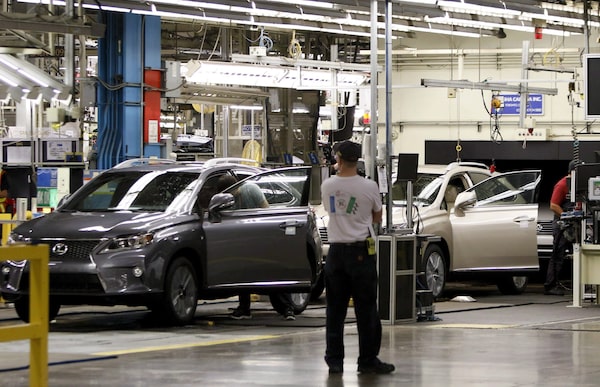
Line workers assemble a Lexus SUV at the Toyota plant in Cambridge, Ont., on July 31, 2015.Aaron Lynett/The Canadian Press
Toyota Canada TOYOF is seeking financial assistance from Ottawa as it plans for the shift to electric vehicles at its assembly plants, a government source said.
The source, who is familiar with the discussion, said the amount sought is in the billions of dollars. It’s not clear whether this means grants or loans. The Globe is not identifying the person, because they are not authorized to speak publicly on the matter.
Toyota Canada spokesman Philippe Crowe declined to comment on any discussions between his company and the federal government but said the company is committed to planning for its future.
“As we build out our future North American manufacturing footprint, toward increasing levels of vehicle electrification, we have a responsibility to study options and opportunities available to us in each market,” Mr. Crowe said in a statement.
“It is not our practice to do this in a public forum. We have nothing to add at this time.”
Ottawa and Ontario have already doled out billions in help to two battery manufacturing plants in the province, including $13.2-billion in federal production subsidies for a new electric-vehicle battery plant to be built by Volkswagen VWAGY in St. Thomas. Then in July, Ottawa and Ontario announced subsidies for a Stellantis-LG Energy Solutions EV STLA-N battery manufacturing plant in Windsor, worth up to $15-billion.
A spokeswoman for Innovation Minister François-Philippe Champagne would not comment on whether Toyota is asking for support.
Asked whether it was possible Toyota might scale back or cease manufacturing in Canada without government support, Mr. Champagne’s communications director Laurie Bouchard called that suggestion baseless. “Toyota and Canada are solid partners as evidenced by the investments and commitments that have been made over decades. We will continue working with Toyota and others, as we position the Canadian auto sector for the 21st century economy,” Ms. Bouchard said.
Flavio Volpe, president of the Automotive Parts Manufacturers’ Association, said he does not have inside information on Toyota’s plans but it makes sense that it would ask Ottawa for assistance. “I wouldn’t be surprised,” he said. “Every one of these automakers is either building EV capacity or battery capacity” and he said it would seem appropriate Toyota has the same conversations with governments that companies such as Volkswagen have had.
“Every single car company is going through the same process: ‘We have to build capacity – where do we do it?’ ”
He noted Toyota’s assembly plants in Cambridge, Ont., are consistently ranked highly for quality and efficiency by third-party experts and that the company has been the biggest automotive investor in Canada over the past 20 years.
The Globe also asked the Ontario government whether Toyota had approached Queen’s Park for financial assistance. Vanessa De Matteis, press secretary to Vic Fedeli, Ontario’s Minister of Economic Development, Job Creation and Trade, declined to say. But she said Ontario hopes Ottawa will continue to partner with the province in supporting the emerging electric vehicle industry and cited an agreement both governments signed this year.
“Through the Canada-Ontario electric vehicle and battery auto pact, Ontario stands at the ready to continue securing jobs for workers. Ontario can’t do it alone. We hope the federal government will continue to be a partner in building up our electric vehicle and battery supply chain,” Ms. De Matteis said.
Countries, including Canada, are scrambling to become leaders in all elements of the electric-vehicle market.
Ottawa has big ambitions in clean technology and Prime Minister Justin Trudeau wants Canada to become “a world leader” in critical minerals and batteries that underpin this sector.
Back in 2018, the federal and Ontario governments announced they were contributing a combined $220-million toward a $1.4-billion upgrade at two Toyota Canada plants.